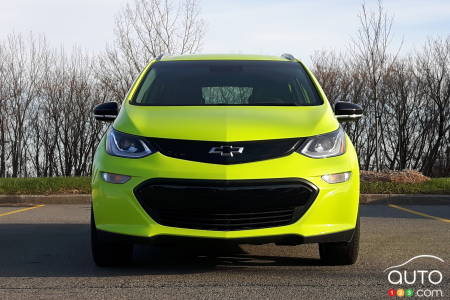The Chevrolet Bolt is under the microscope at the National Highway Traffic Safety Administration (NHTSA), after three models of the EV suffered similar fire damage. Although the cause of the fire is not yet known, the agency noted that the fire damage appears to be concentrated in the car's battery compartment.
Fires have been reported on 2017, 2018 and 2019 Bolt models, and all three exhibited a similar burn pattern on or around the rear seats. NHTSA issued a statement explaining that the fires apparently began in the battery compartment before spreading to the passenger compartment; they did not start inside the passenger compartment.
The complaints made by customer provide more information about the problem. According to a March 2019 report, owners of a 2018 Bolt parked their vehicle in their garage at approximately 3:45 p.m. and connected it to a Level 2 terminal. They were warned by a passerby that the car was on fire around 5:00 p.m. Several neighbouring homes had to be evacuated and firefighters spent about three hours putting out the fire. The homeowners reported smoke inhalation injuries, again according to the NHTSA release, and had to hire a professional to clean their home. They added that the rear compartment was "apparently burning from the inside, in the area of the battery cells.
Chevrolet sent two engineers to inspect the Level 2 charger, and then purchased the Bolt from the insurance company. Nothing has been made public so far.
Filed in July 2020, the second complaint tells a story that’s different in one key respect: the Bolt was not plugged in. In this case, the owners of a 2019 Bolt drove away from their home with the vehicle fully charged, and 20 km or so later they parked and turned off the car, which reportedly caught fire about 20 minutes later. Firefighters spent an hour putting out the fire, left and were called back when the Bolt caught fire again. The car was then towed to the Chevrolet dealership where a fire broke out for a third and final time. Again, the flames came from the back seat. No injuries were reported and the owner noted that no warning signs appeared on the dashboard.
Details of the third case are not available.
Discover Shopicar! All new makes and models and all current promotions.

NHTSA's investigation is designed to assess the extent, frequency, circumstances and safety implications of the suspected fires. Depending on what it finds, NHTSA will either close the investigation (which would likely mean that the fires were isolated incidents not related to a manufacturing defect) or press on. The agency noted that that nearly 78,000 units of the Bolt built between the 2017 and 2020 model years could be affected by an eventual recall.
We will, of course, update this news when more information on this situation becomes available.





